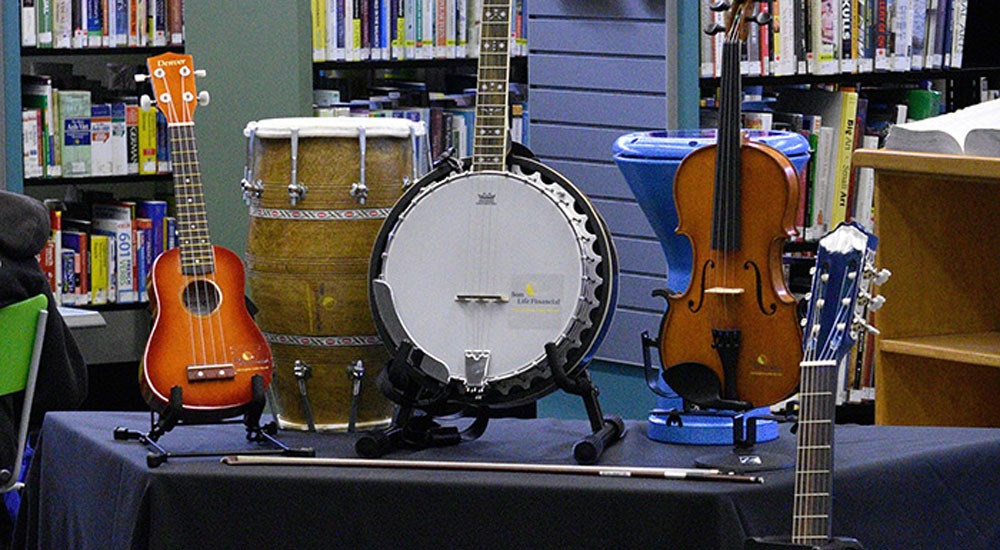
January 14, 2020; Next City
As NPQ has regularly noted, libraries have become increasingly versatile in their community offerings, whether their clientele live in small rural towns or big cities. Sometimes the offerings are modern, like providing makers’ spaces, but others are more classic. Among the new lower tech offerings is the move to lend out musical instruments. It’s a trend more often seen in larger cities, though examples can be found in smaller communities, too—like Lopez Island, Washington, home to about 2,500 residents.
An illustration of how novel renting out musical instruments remains is provided by the Central Branch of Brooklyn Public Library. This library may be 78 years old, but it only began to rent out instruments less than two years ago. Under the new program, reports Julia Hotz at Next City, “For a 30-day period, any library-card-holder (with the permission of an adult, for minors) can take home instruments that range from electric guitars and keyboards to drum pads and cowbells. The library also boasts on-site recording studios, where borrowers can freely play.”
Peter Otis, manager of the music lending program and a librarian within BPL’s arts and history division, tells Hotz, “It was so popular right away—we started with 20 instruments and in the first 24 hours, the instruments were all booked up.” To date, the library has lent out over 600 instruments to patrons, and Otis says he gets email requests daily.
“There are all sorts of reasons why someone might not have access to musical instruments,” Otis notes. “Maybe someone has always wanted to try it out but couldn’t, because instruments are so costly.” As Hotz points out, “Even when bought second-hand, most instruments cost several hundred dollars, and in a borough where one fifth of residents live below the poverty level and almost 12 percent are food insecure, every dollar counts.”
The BPL program launched in May 2018 when Otis and two colleagues applied for a $10,000 grant with BKLYN Incubator, a seed funding initiative for community-based library services. The program now would seem to have permanent status.
Sign up for our free newsletters
Subscribe to NPQ's newsletters to have our top stories delivered directly to your inbox.
By signing up, you agree to our privacy policy and terms of use, and to receive messages from NPQ and our partners.
“Music is a language just like any other,” Otis observes, “and this—encouraging patrons to understand that language—is part of a library’s mission to encourage literacy.”
Today, Brooklyn’s Central Library remains the only New York City public library to lend out instruments. Another nearby urban example is in Philadelphia, where the city’s Free Library has run an instrument lending service since 2016 and currently has 45 instruments available. But the practice appears to be really taking off in Canada. Anna Kwang, musical services specialist at the Toronto Public Library, operates a program similar to those in Philadelphia and Brooklyn in the city’s Parkdale neighborhood branch where, she says, “most people…couldn’t afford to buy or rent an instrument on their own.”
Kwang says the instrument loans have boosted overall library use. “When someone borrows a keyboard, they might see if we have scores or keyboard books for beginners that they could rent,” Kwang says.
Parkdale launched its program in 2016 with a two-year $140,000 grant from Sun Life Financial, an insurance company. Since then, a second iteration has opened in Toronto. These two alone now have 250 instruments. There’s been a subsequent effort to seed musical instrument lending programs among public libraries in ten other “priority locations” throughout Canada, including major cities like Ottawa, Halifax, St. Johns, and Winnipeg.
“We know people who travel an hour on public transit just to borrow an instrument,” Kwang says, adding that Toronto plans to add a third soon.
Despite fears that lending out instruments for free could discourage sales, by and large that hasn’t been the case. In fact, Kwang says that in Toronto the lending service has encouraged local business, as borrowers “test drive” instruments before they decide whether to buy one for themselves. Many cities also partner with local stores when they roll out their lending programs. Hotz points out, “Philadelphia employs a local shop to repair the instruments, and Brooklyn bought its string instruments from a nearby Guitar Center.” The biggest challenge, as librarians in Brooklyn, Philadelphia, and Toronto agree, is keeping up with demand.—Steve Dubb












